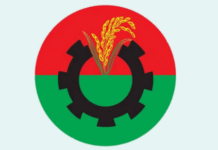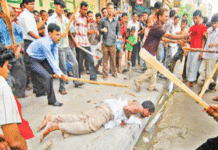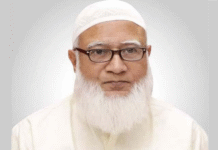TBS

Highlights:
- BNP plans limited seat-sharing with allies in upcoming election
- Allies requested 217 constituencies; BNP may allocate 40–50
- Ganatantra Mancha, LDP, and others submitted detailed seat demands
- BNP gave preliminary “green signal” to 12 ally candidates
- Party fears weak allies may struggle to win allocated seats
- Final decisions await election schedule and leadership consultations
The BNP is considering sharing parliamentary seats with its allies in the upcoming 13th national election. The party has already asked its partners for lists of potential candidates. Several alliances and parties have submitted lists for 217 constituencies, from which the BNP has given a “green signal” to a few candidates.
Some other parties have also expressed interest in forming an alliance with the BNP, asking for 110 seats. While these parties want majority seats from the BNP, the party may ultimately leave only 40-50 seats.

Who wants what
According to sources, Ganatantra Mancha has asked for 138 seats, the Liberal Democratic Party (LDP) for 13, the 12-party alliance for 21, the Nationalist Like-minded Alliance for 9, the National Democratic Movement (NDM) for 10, Gono Forum for 15, BJP for 5, and the Labour Party for 6.
The AB Party plans to form a separate alliance with several centrist groups but is not ruling out a BNP-led electoral coalition. If that happens, it wants to negotiate directly with Tarique Rahman and is expected to seek 30 seats.
The Gono Odhikar Parishad has not yet decided whether to join the BNP-led alliance. It has been in contact with both the BNP and Jamaat-e-Islami while also preparing to contest independently. However, a party insider said it would likely ask for 30 seats if it joins the alliance.
A BNP-NCP alliance has not yet taken shape, but behind-the-scenes talks are reportedly underway. The BNP is also keen to bring on board the newly formed party led by student leaders from the recent mass movement.
BNP Standing Committee Member Maj (retd) Hafiz Uddin Ahmed said the party plans to allocate 40–50 seats to allied and friendly groups. Whether the BNP will form a formal alliance or reach seat-sharing understandings on a case-by-case basis has not yet been decided. Party leaders said a final decision would be made after the election schedule is announced.
Asked about the matter, BNP Standing Committee Member Amir Khasru Mahmud Chowdhury told The Business Standard that the party has yet to make any decision. “When the time comes, we’ll hold discussions and decide accordingly. But we’ve always said the BNP will form a national government. So, beyond elections, the parties involved in the simultaneous movement will also have roles in forming the government,” he said.
Meanwhile, the party’s Standing Committee Member Salahuddin Ahmed said BNP is working on forming a broader alliance by bringing together all political parties engaged in the anti-fascist movement.
“Through this, we want to cross the bridge of the upcoming national election together. The anti-fascist unity is our greatest strength,” he said after paying tribute at the mausoleum of BNP founder Ziaur Rahman yesterday on the 47th founding anniversary of the Jatiyatabadi Jubo Dal, the party’s youth wing.

The 12 who got ‘green signal’
Though not yet formally announced, the BNP has given a green signal to 12 allies. Further discussions are ongoing about additional constituencies to be shared. Once the election schedule is declared and nominations are finalised, the official announcement will be made. Those not selected for nomination may still be recognised in the upper house, BNP sources said.
The 12 who have received the green signal are – Mustafa Jamal Haider, chairman of Jatiya Party (Zafar), for Pirojpur-1; Mahmudur Rahman Manna, president of Nagorik Oikya, for Bogura-2; Andalib Rahman Partha, chairman of Bangladesh Jatiya Party (BJP), for Dhaka-17; Shahadat Hossain Selim, chairman of Bangladesh LDP, for Lakshmipur-1; Syed Ehsanul Huda, chairman of Bangladesh National Party, for Kishoreganj-5; Bobby Hajjaj, chairman of NDM, for Dhaka-13; Zonayed Saki, chief coordinator of Gonosonghoti Andolon, for Brahmanbaria-6; Prof Omar Faruk, son of LDP chairman Col (retd) Oli Ahmed, for Chattogram-14; Dr Redwan Ahmed, secretary general of LDP, for Cumilla-7; Dr Fariduzzaman Farhad, coordinator of the Nationalist Like-minded Alliance and chairman of NPP, for Narail-2; Nurul Haque Nur, president of Gono Odhikar Parishad, for Patuakhali-3 and Rashed Khan, general secretary of the same party, for Jhenaidah-2.
Concern over winnability of shared seats
BNP leaders believe that under current conditions, no candidate can win simply because of party endorsement — they must win on merit and popular support. The party is therefore worried about the chances of victory in constituencies left for allies. Many of the potential ally candidates lack organisational presence or strong local bases and will have to rely on local BNP structures. If opposition candidates from other parties are more acceptable to voters, even BNP’s support may not secure victory for the allies — risking loss of those seats.
BNP insiders also point out that there are multiple nomination aspirants for almost every constituency within the party — individuals who have stood by the organisation for 17 years through political struggles, persecution, and arrests. Party leaders fear that if an outsider is nominated as part of an alliance deal, local BNP workers may not fully back them in the field.
However, BNP’s acting chairman Tarique Rahman has issued strict instructions to leaders and activists at all levels to extend full support to the party’s nominated candidates.
The BNP is also reviewing some additional potential seat concessions.
BNP’s seat-sharing in past elections
In the 11th parliamentary election on 30 December 2018, the BNP-led alliance contested all 300 seats. The party left 19 for the Dr Kamal Hossain-led Jatiya Oikya Front — 7 for Gono Forum, 4 for JSD, 4 for Nagorik Oikya, and 4 for Krishak Sramik Janata League.
The then 20-party alliance received 39 seats under the BNP’s sheaf of paddy symbol, including 22 for Jamaat-e-Islami, 5 for LDP, 2 for Khelafat Majlish, 3 for Jamiat Ulema-e-Islam, 2 for Jatiya Party (Kazi Zafar), and 1 each for BJP, Kalyan Party, NPP, Labour Party, and PPB — a total of 58 shared seats.
In the 9th parliamentary election on 29 December 2008, BNP left 39 seats for Jamaat-e-Islami, its main ally in the four-party alliance, and two each for Bangladesh Jatiya Party (BJP), Islami Oikya Jote, and Jamiat Ulema-e-Islam.
In Bangladesh, alliance politics and seat sharing are nothing new. Smaller parties have long contested elections under the symbols of larger parties through alliances. Previously, many politicians – including Hasanul Haq Inu of the Jatiya Samajtantrik Dal and Rashed Khan Menon of the Workers Party of Bangladesh – contested polls under the Awami League’s boat symbol. This time, however, that option will not be available. Even if electoral alliances are formed, candidates must contest under their respective party symbols.
The interim government has approved a draft amendment to the Representation of the People Order (RPO) incorporating this provision. However, several political parties have opposed the amendment.









